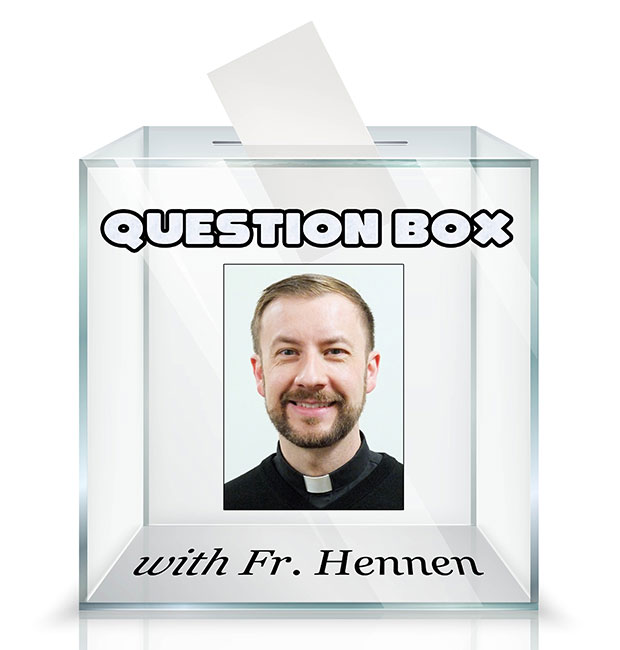 By Fr. Thom Hennen
By Fr. Thom Hennen
Question Box
Q: Who can purify the vessels at Mass and when should this be done?
A: Because we believe Jesus Christ to be truly present (“body, blood, soul and divinity”) in the elements of the consecrated bread and wine in our celebration of the Eucharist, you have probably noticed the priest or deacon in your parish taking extra care in cleaning or “purifying” the vessels used. This is to ensure that any fragments of the sacred host or remaining precious blood are reverently consumed.
The General Instruction of the Roman Missal states: “The sacred vessels are purified by the Priest, the Deacon, or an instituted acolyte after Communion or after Mass, in so far as possible at the credence table.” Clearly, therefore, it is the priest, deacon or an instituted acolyte who may purify the vessels.
What is an instituted acolyte? This is something more than an “altar server.” The “minor orders” (now called “ministries”) of lector and acolyte were retained in the reforms of the liturgy and formation for holy orders following the Second Vatican Council. (Previously there had been four minor orders: porter, lector, exorcist and acolyte.) Typically, the only instituted acolytes you will find are seminarians or candidates in formation for the permanent diaconate.
In his 2021 motu proprio letter Spiritus Domini, Pope Francis opened these ministries to other qualified laity, modifying Canon 230 § 1 to read: “Lay persons who possess the age and qualifications established by decree of the conference of bishops can be admitted on a stable basis through the prescribed liturgical rite to the ministries of lector and acolyte.” Even so, you are not likely to see this, at least not quite yet. Dioceses in the United States are still waiting on the bishops’ conference (USCCB) to give us direction on what formation for these ministries should look like.
As to when the purification of the vessels should be done, the instruction is clear that it can be either after Communion or after Mass. At Sacred Heart Cathedral in Davenport, the deacon and I take care of this at the credence table during the period of silence following Communion. The issue I find with waiting until after Mass is that the sacristan or those responsible for the regular washing (not purification) of the vessels usually want to start that right after Mass. However, the priest or deacon may still be greeting people and the vessels must be purified prior to regular washing.
How should this be done? Again, the General Instruction states: “The purification of the chalice is done with water alone or with wine and water, which is then consumed by whoever does the purification. The paten is wiped clean as usual with the purificator [small rectangular cloth].” To my mind, this should be done carefully, reverently and efficiently. The priest, deacon or instituted acolyte should not be sloppy or hasty but also not overly scrupulous. A magnifying glass should not be needed, much less a microscope.
In some churches you may notice a small jar of water with a lid on it next to the tabernacle. This is an “ablution cup” and is for the use of the priest or deacon after reposing the Blessed Sacrament in the tabernacle or after purifying the vessels to wash his fingers. The water in this cup should be poured out in the sacrarium and replaced regularly. The sacrarium is a special sink in the sacristy that goes directly to the ground, and so is meant for the washing and rinsing of the sacred vessels after they have been purified.
(Father Thom Hennen serves as the pastor of Sacred Heart Cathedral in Davenport. Send questions to messenger@davenportdiocese.org)










